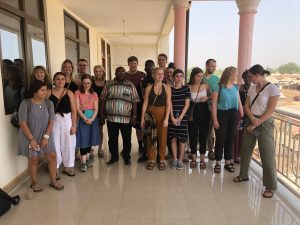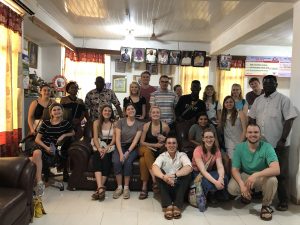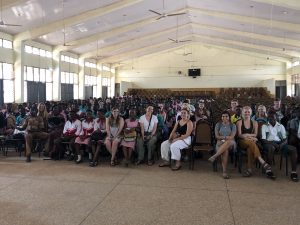Blogpost for Jan 9th
This morning we woke up to a forecast of 100-degree weather while in Northfield it’s 9 degrees. Everyone quickly got ready for our 8 o’clock departure which usually turns into an 8:30 exit.
This morning we had a lesson on what should be worn in Ghana. Many of the girls had shorts on and Professor Abdulai took the opportunity to point out that shorts that show the thigh are not considered decent. A couple people had to change and then we were on our way to breakfast. This prompted a conversation about how Tamale is prominently Muslim and some of the teachings of Islam in modesty and approved dressing discussed.
At breakfast, we had our regular fried eggs and bread which is a little like French toast, beef liver, beans, and a new fish sandwich that was very good. We are all starting to catch on to the fact that our meals are always going to be around 2 hours. Meals are definitely a leisurely event here.
After breakfast, we had a discussion about divorce and marriage in Ghanaian society. Recently in The NY Times, there was an article about how there has been an increase in the divorce rate in West Africa and how women have been given more autonomy in society. But to put things in context, divorce in Muslim dominated West Africa is still low because of traditional and Muslim mechanisms to prevent divorce. In these societies, despite th social change that has made many independent of rational social structures, Marriage is still a family or clan affair and the clan mechanism try to resolve marriage disputes, and issues that might lead to divorce. In Islam, divorce was the last thing the Holy Prophet Islam, Mohammed (SAW) permitted and yet still instituted many conditions to discourage it’s prevalence. Things are fast changing but how fast and how prevalent, should be discussed with the specific context instead of the blanket generalizations as portrayed in the New York Times article.
Additionally, we discussed marriage and how Ghanaian practices polygamy so men can have multiple wives. Prof. Iddrisu enlightened us on how colonization affected the fortunes of Women in West Africa, where the man came to be considered the breadwinner and the woman gettisoned to the private sphere, the two of who used to enjoy a complimentary life style, working to provision for the home. The woman was turned into one whose role was to make the home comfortable for the man. This marginalized the power and fortunes of the woman, but thing are beginning to change with the women’s movement and struggle to better the lives of Women.
Next, we went to a lecture by Dr. Felix Yakubu on Slavery in Northern Ghana. He talked about the difference between the Slave-trade before colonization or commercialized slave trade. He said slaves were part of tribute to States, and that slavery was not a permanent condition. The Atlantic slave trade took advantage of the slavery that already existed in Ghana and other countries in Africa and monopolized across the continent. This point is highly debatable and a look at the work of Walter Rodney and J. D. Fage, two scholars who spent lots of publications arguing this issue. In a later blogpost, we hope to bring you a synthesis of this debate.

We also learned about how communities responded to the regime of Slave trade and Slavery. This included foreign alliance, building walls, or fleeing to caves. However, he also talked about how the chiefs were compliant to the slave trade. This caused corruption of social institutions, and tensions we see today between ethnic groups or communities.
Dr. Felix Yabuku also touched on the emotional trauma that is present in Ghana, as a result of the slave trade. The remembrance of how their ancestors were treated has caused a lot of psychological distress that is one of the reasons for the silences inherent in discussions of Slavery and the slave trade in Ghana.
Lastly, Dr. Felix Yabuku touched on the African Diaspora and how people today within Ghana cope with their past. The African Diaspora within Ghana focuses on the losses and the destruction of families. There are communities that are made up of refugees that fled from the slave raiders and have no clue of their original roots. Some are still trying to find their origins after being displaced by slavery. We then discussed Panafest that offers opportunities for people to find their roots especially for African Americans
The Tamale Snr. High School
After the lecture, we headed to the Tamale Senior High School where Professor Abdulai went to school and was a teacher for a while. It used to be called the Northern Light. It has over 2,000 students and numbers might increase as a result of the recent government reforms called the double track of intake. We met the headmaster, Mr. Sayibu Adam Wilberforce and he told us about the history of the school. Only old boys of the school get to head the school but Mr. Adam is the only non alum to have headed the school. This is probably because of his good record heading smaller schools. He’s nearing retirement, having headed various types of schools for 20 years now. The headmaster talked about how social change has increased the attendance of the students. The headmaster then showed us the awards that the school had won including academic and athletic trophies.

After the meeting with the headmaster, we had a short tour of the grounds: saw the library, the teacher’s lounge and the assembly hall where students were having a debate. We got to mingle for a couple of seconds, and in classic Abdulai fashion we took a couple of pictures and left.

After the school we went to the market again and searched for skirts. We didn’t find any, but we found fake Gucci sandals and rings. We also got our first haggling experience with help from jay-z, Abdulai, and Tina. The market is always quite the experience for all the senses. However,it was a swift visit because we had to get to lunch.
Today at lunch we learned that if we had any leftovers, we could leave them on the table for the small children always lurking around to greet us. However, we asked Abdulai if we could have smaller portions next time so we could prevent large amounts of leftover food.
After a short break, we had our first chance to go out into Tamale on our own. Most of choose to go to a market and walk around. The primary challenge of the market was not to get lost!
When the bus dropped us off everyone scattered in groups of two or three and hoped that we could find it when we came back. People bought lots of goods and tried to haggle without help most of us were not very successful and will need to learn how to be sterner. Many people bought fabric which Mannie was pleased about, and a couple of the boys hired tailors to make them pants.
We ended the day with dinner at a food stand that was making fried noodles with veggies which were very delicious. We went back to the hotel and ate while reflecting on the day and what we learned.
